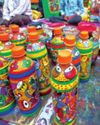
This paradox is a biting reality. The geographical distance between the north-east and the so-called mainland India is certainly not that much. The distance between north-east India and New Delhi is shorter than between New Delhi and the south Indian states. However, the psychological distance between north-east India and New Delhi has always been larger. New Delhi cites remoteness as the prime reason for the north-east's backwardness, as the region has failed to develop at the same pace as other parts of India have been doing. But the fact is that such a narrative is different in the case of other parts of India. This dual approach can never hide the reality of what successive regimes of New Delhi have done so far.
Another aspect is the approach of 'mainland India', accusing the region of regional and linguistic biases too often. However, regionalism and linguistic identities exist almost everywhere in India. One classic example is certainly the approach of the South Indian states. The same is true in the case of Maharashtra, Rajasthan, Gujarat, and northern and western Indian states.
But nobody counts it, as if they have the legitimate right to do anything in the name of saving identities. But people from the north-east are often unfairly attacked for taking a similar stance.
The stubborn approach of the south Indian states not to use Hindi, or Maratha Ashmita, and other such stances are often justified.
In fact, one of the major reasons behind India's failure to adopt a tough stand against neighbouring states is the pseudo-cultural and linguistic biases of certain sections.
India must keep in mind Tamil, Bengali, Nepali, and even Punjabi sentiment before framing policy regarding Sri Lanka, Bangladesh, Nepal and even Pakistan to a certain extent.
This story is from the December 02, 2024 edition of The Statesman.
Start your 7-day Magzter GOLD free trial to access thousands of curated premium stories, and 9,000+ magazines and newspapers.
Already a subscriber ? Sign In
This story is from the December 02, 2024 edition of The Statesman.
Start your 7-day Magzter GOLD free trial to access thousands of curated premium stories, and 9,000+ magazines and newspapers.
Already a subscriber? Sign In
DADIMA TALES
When I was a primary school student, 'Dalmia' brand of glucose biscuits were very popular. They were consumed with tea in middle-class households like ours.

H-1B visas
SIR, I refer to \"H1-B Dilemma\" (January 1). Donald Trump's endorsement of the H1-B visa program amid the debate between Elon Musk and Steve Bannon reflects a calculated yet controversial stance on immigration policy.
Toxic Legacy
Four decades after the catastrophic gas leak that devastated Bhopal, the recent removal of toxic waste from the Union Carbide plant marks a small yet significant step in addressing the lingering fallout of one of the world's worst industrial disasters.
Dense fog paralyses Delhi-NCR, most of North India
North India came to a standstill on Saturday, as intense cold waves and dense fog blanketed the region, causing widespread disruptions.

Nationalistic identity and pride
(An excerpt from 'India's New Right: Powering The Current Wave of Nationalism and Civilisational Revival')

Operation Iron Tempest and the treachery around narcotics
(An excerpt from 'The Nukes, the Jihad, the Hawalas and Crystal Meth')

Paribesh Bandhab Haat: Celebration of tradition and sustainability
Upon entering the Paribesh Bandhab Haat, one is immediately carried away to a different realm of vibrant hues, cheerful faces and a serene atmosphere nestled in the lap of nature.
Two more arrested in Malda TMC leader's murder case
Two more suspects have been arrested in connection with the murder of popular Trinamul Congress leader Babla Sarkar.

Bus from Kolkata topples near Mukutmanipur, 15 injured
A bus carrying picnic revellers from Kolkata toppled near Mukutmanipur, a tourist destination in Bankura this morning, leaving at least 15 injured.
South Bengal Sports Carnival
Soccer star Bhichung Bhutia will lead a marathon with the participants to give a boost to the games